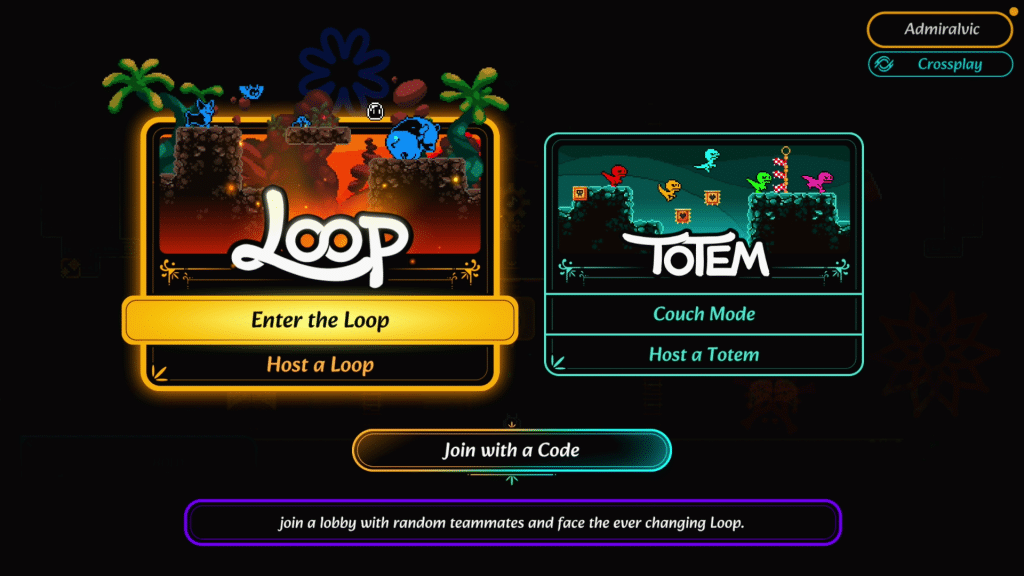

One thing I appreciate about Devolver Digital is the number of unique and interesting experiences they publish. Even if they’re not always groundbreaking, they feature a wide variety of fascinating gimmicks. In the case of KarmaZoo, it brings the hectic nature of roguelikes to a multiplayer experience that involve similar feelings found only in Mario Party. With such an interesting concept, is it worth the cost of entry, or are you better off keeping your sanity?
At the start, KarmaZoo explains the concept through a rather simple tutorial. After finishing the first section, there is a dedicated stage where a bot works together with players to introduce them to the world. As someone who frequently plays with inexperienced people online, I greatly appreciate this tutorial. It might not teach everything, but it presents the fundamentals in a way where players can be familiarized with them before playing with others.


After finishing, players can choose to play either Totem, or Loop. To put it simply, Totem is PVP, with Loop obviously being co-op. Unfortunately, neither mode can be played solo/alone, though Totem does offer online, or offline matches.
While the real selling point is Loop, I wanted to briefly explain Totem. In this mode there are four distinctly different matches. These include Rush, Eat, Descend, and Burn. Each of these modes offer a randomly generated mini-game where players need to accomplish different tasks to come out on top. These can be an absolute blast with a large group, as they’re not entirely skill based.
Sometimes placement/tactic is enough to win. Other times players make a mistake that inadvertently assists other players. It makes things exciting, especially since you can dictate how many rounds you play, the variety of said rounds, and more.
While it’s unfortunate Totem does not currently offer matchmaking, the real appeal is Loop. In Loop, up to 10 players can work together to complete four randomly generated stages. Some of these are easy, others hard, with there being a slight learning curve with some.
Some stages would force players to work together to light bulbs, others used red light, green light, there were stealth objectives, not to mention several that required multiple players to work together. Objectives seemingly altered based off the number of players, so you’d never get an event that is impossible with your current set, though some sections might be inaccessible for one reason or another.
What immediately sold me on the concept of KarmaZoo is the variety these stages offered. Some stages were incredibly difficult requiring great coordination, whereas others punished players for approaching it the wrong way. These challenges kept things interesting beyond simply doing a mindless tasks while collecting fruit. However, it’s also KarmaZoo’s greatest problem.
One of the struggles of reviewing a game like KarmaZoo is the sheer amount of random elements. These include which objectives you get, animals you have access to, what post-game bonuses you’re offered (typically pointless modifiers or silly gimmicks), to the players themselves. Some of these things can be mitigated, like you can always select one animal, or play with friends to largely control the experience, but for everyone else it relies on what you get.
Since there are only two ways to lose, either having time run out, or being too far from another player for an extended period of time, certain failings can be extremely detrimental. As a fan of platformers I had no issue transversing the world of KarmaZoo. When one of my partners struggled, it forced me to progress at the same general pace. However, they made a mistake, fell, and while I attempted to meet up with them to save the run, an untimely death caused a wipe.
Several puzzles also rely on someone understanding the solution. I was clever enough to figure out the red light, green light one, though my partners were not. Because they kept trying to move on red, not taking a moment to watch what I was doing, a substantial amount of time was wasted. This happened throughout the run, making it more frustrating than it needed to be. Such stages will get better, as I imagine people will start to memorize these modes, but it’s not something that is guaranteed to happen.
Even if randomness is a factor, a lot of this can be mitigated by unlocking animals. This is something I mentioned earlier in the review, and is substantial part of the KarmaZoo experience.
To encourage supportive behaviors, KarmaZoo rewards players for assisting teammates. Practically every action that aids a teammate will result in you receiving a heart (currency). Players can also give these to teammates to show support. It’s a lovely mechanic that I think works extremely well.
Upon finishing a run this currency could be used to unlock resources, tips, additional areas, and new animals. Every animal has one or more gimmick to help players finish a level. One of the most notable is Flame, as it creates a safe spot if one is present, though they all offer something. Some are team based, others selfish, with a few just making the game easier for the person playing.
It’s a cool system as it relies on everyone coming together to fully explore certain stages. The only downside is specific animals will become the meta, or see very little play because their ability isn’t particularly useful. But, even without an animal most levels are more than doable if you know what to do.
To make things far more interesting, certain content is also hidden behind a unique system called KarmaPass. Building on the supportive foundation, instead of investing a large amount of time to unlock new content through a battle pass, or similar system, it unlocks by simply playing the game. This included every platform, as KarmaZoo is also cross-play, making for an interesting experience that will expand overtime.
KarmaZoo: At its core I think KarmaZoo is a fun experience. It's a random, often challenging, experience that forces players to work together. Unfortunately, since it is random, every experience will be a bit different. Sometimes you'll get a crack team that plows through each stage, whereas other times they'll get stuck on something easy and you end up losing. Since I can only review the foundation, I do think there is enough here to keep players interested, especially if multiple friends join the zoo. – Grant
Editor’s Note: KarmaZoo was reviewed on PlayStation 5, and a copy was provided to us for review purposes.
Indiana Jones and the Great Circle scores big at the Nordic Game Awards 2025 with…
Tons of Warhammer PC games are currently offered with steep discounts on multiple online retailers…
Neil Druckmann, the Creative Director for The Last of Us series, has recently confirmed that…
Spider Man 2 still remains a very sloppy release on PC. Instead of properly fixing…
More than 70% of online only titles have been scrubbed away from earth. Some PC…
Warhammer 40.000: Rites of War is currently free on GOG. PC gamers remember how amazing…